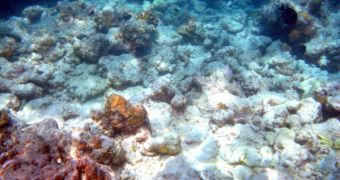The symbiotic relations that form between corals, algae and fish are essential for preserving a balance of species in the oceans of the world. Any measure of imbalance and the whole ecosystem can collapse, which would send ripples throughout the maritime species, as inter-connections go a long way. The whitening of the reefs, called coral bleaching, is accelerating, putting hundreds of fish species at risk of extinction in a very short period of time.
[ADMARk=1]During the latest study, more than 60 reefs throughout the globe were analyzed, and the impact that white corals have on their surroundings measured. Results showed that the decline in reef populations, caused by the heating of the waters due to global warming, triggered a domino effect in the ecosystem. Microscopic algae, which live in symbiosis with the corals, separate from them and die, thus the white color that more and more reefs are starting to exhibit.
This causes various changes in the diversity, composition and dynamics of hundreds of fish species, as corals become more and more sparse and the architecture of their reefs less complicated. This causes some very rare fish species that live hidden among the corals to be exposed to predators and decimated, because their single "hidden ace," stealth, has disappeared.
Fish that are dependent on the reef for laying their eggs also exhibit dramatic population declines, as the breeding grounds diminish and the distances they have to travel to get to an appropriate place for mating increase. As some fish disappear, others take their place. Normally, this would be a good thing, but the new inhabitants of the reefs are herbivorous, which means that they feed on the algae that multiply on corals.
Deprived of their "symbiots," which provide them with nutrients, coral polyps don't get enough food and eventually die. But before that, they are eroded by fish and fall apart. If, due to warmer waters, larger algae set in or sand reaches the reef, then the corals' days are numbered, as they don't really get along. The situation has become so desperate, that environmentalists urge governments to create special reef-growing reservations, where the corals could grow, undisturbed by outside influences.

 14 DAY TRIAL //
14 DAY TRIAL //